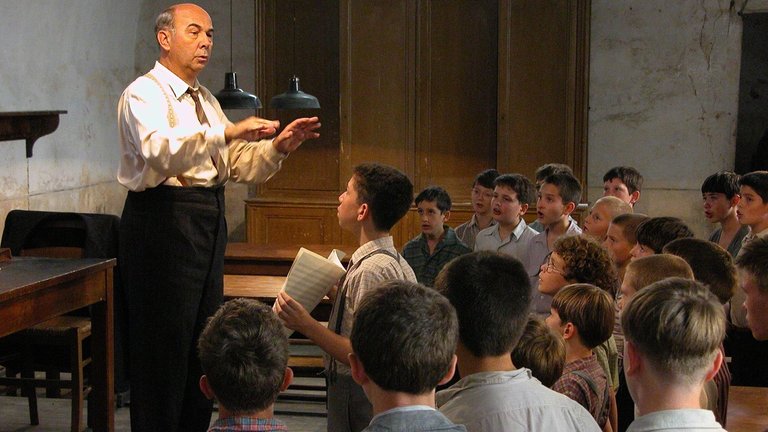Retro Film Review: The Chorus (Les Choristes, 2004)

"When in Rome, do as the Romans do" is a principle evidently embraced by many non-American filmmakers aspiring for Oscars. For many of them, the Academy Award represents a crucial gateway to Hollywood, leading to films that closely mirror Hollywood mainstream productions in every aspect except setting or language. One manifestation of this trend is the abundance of non-American Oscar contenders featuring heartwarming yet sentimental narratives and endearing children as central characters. The Chorus, a 2004 French drama directed by Christophe Barratier, falls into this category.
The screenplay, written by Barratier and Philippe Lopes-Curval, draws inspiration from the 1945 classic French film A Cage of Nightingales. The plot starts in the present day as renowned conductor Pierre Morhange (portrayed by Jacques Perrin) attends his mother's funeral and reconnects with an old childhood friend Pepinot (played by Didier Flamand), who reveals the existence of a diary left by their former teacher Clement Mathieu (played by Gerard Jugnot). The story then transports us back to 1949 when Mathieu, a failed musician, reluctantly takes on various odd jobs, including that of a teacher at a reform school for troubled boys. This institution caters to the most challenging delinquents and is overseen by the authoritarian headmaster Rachin (played by François Berléand), who advocates for corporal punishment as the sole educational method. Mathieu, with his unconventional approach, gradually wins over the boys' hearts and minds by establishing a boys' choir.
Barratier's meticulous attention to detail is evident throughout The Chorus, which doesn't shy away from incorporating familiar tropes seen in films about dedicated educators transforming the lives of underprivileged or troubled students. Once again, art serves as a powerful tool in guiding unruly young minds towards constructive outlets rather than succumbing to violence or societal malaise. The protagonist faces challenges from prejudice, conservatism, and bureaucracy - embodied by François Berléand's character, who often portrays antagonists in French cinema. Barratier even introduces a subplot involving the protagonist developing feelings for one of his pupil's single mothers, perhaps to dispel any doubts about his altruistic motives.
With a plot that initially appears safe and formulaic, The Chorus risks blending into the sea of forgettable saccharine cinema. However, even within such well-trodden territory, standout performances can elevate a film. Gerard Jugnot's portrayal anchors the film with his unassuming middle-aged appearance, adding a touch of realism to the narrative. The delicate balance between humour and pathos - crucial for this genre - is skilfully achieved in The Chorus. While the music may not be groundbreaking, it complements the story well, and the professional boys' choir featured in the film delivers a solid soundtrack. For most viewers, The Chorus will likely conclude as a pleasant cinematic experience, even if few openly acknowledge its appeal.
RATING: 6/10 (++)
(Note: Original version of the review is available here.)
Blog in Croatian https://draxblog.com
Blog in English https://draxreview.wordpress.com/
InLeo blog https://inleo.io/@drax.leo
Hiveonboard: https://hiveonboard.com?ref=drax
Rising Star game: https://www.risingstargame.com?referrer=drax
1Inch: https://1inch.exchange/#/r/0x83823d8CCB74F828148258BB4457642124b1328e
BTC donations: 1EWxiMiP6iiG9rger3NuUSd6HByaxQWafG
ETH donations: 0xB305F144323b99e6f8b1d66f5D7DE78B498C32A7
Posted using CineTV